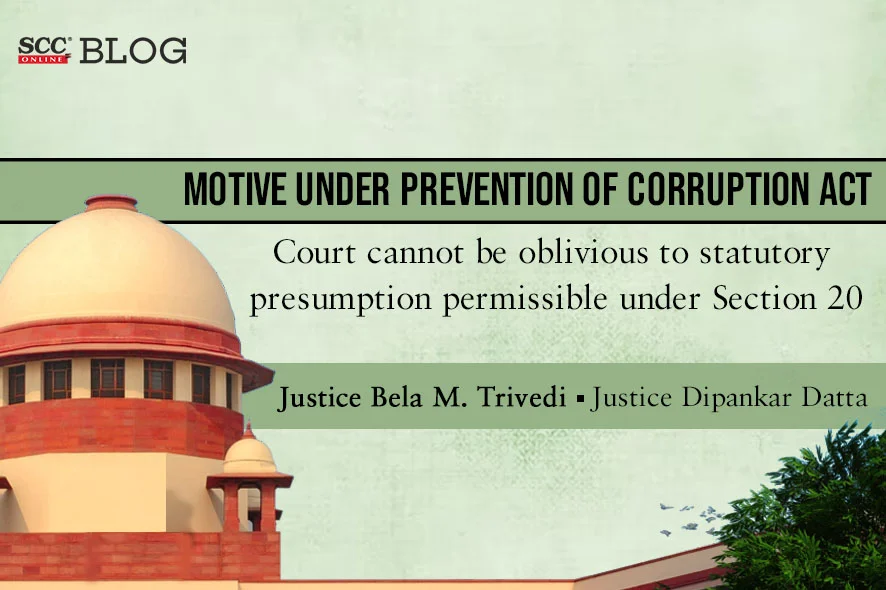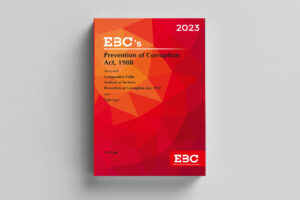Supreme Court: In a Criminal Appeal challenging judgment and order passed by the Andhra Pradesh High Court on 21-03-2011 confirming the Trial Court’s order convicting the appellant for offences under Sections 7, 13(1)(d) read with Section 13(2) of Prevention of Corruption Act, 1988 (‘PC Act’) and sentencing him to imprisonment, the Division Bench of Bela M. Trivedi* and Dipankar Datta, JJ. found the instant appeal devoid of merits while explaining the scope of presumption permissible under Section 20 of PC Act.
The Trial Court had sentenced the appellant to 1-year simple imprisonment for an offence under Section 7 with fine of Rs 1000, 2 years of rigorous imprisonment with a fine of Rs 2000 for offence under Sections 13(1)(d) r/w 13(2) of PC Act. The appellant had passed away; hence, the Court had permitted his wife to proceed further with the instant appeal vide Order dated 31-08-2023.
Background
The prosecution case reflected that the appellant demanded and accepted a sum of Rs 1500 as gratification from the de-facto complainant while discharging his duty as the Sub Registrar, Cooperative Societies, for himself and the other accused, being the Deputy Registrar Cooperative Societies in the office of Divisional Cooperative Khammam. The same was done as a motive or reward for showing an official favour by allowing the complainant to continue as the President of the Society. The chargesheet in the instant matter was laid against the appellant and another, however, the said person expired while the trial was pending. Hence, the appellant was tried alone. The de-facto complainant also expired prior to commencement of the trial, and thus, could not be examined by the prosecution.
Trial and High Court’s Findings
Several people were examined, and documentary evidence was adduced in support of the prosecution case. On closure of prosecution evidence, the appellant was examined under Section 313 of Criminal Procedure Code, 1973 (‘CrPC’), wherein he had denied the allegations levelled against him and had stated that he was falsely implicated. However, the Trial Court held that the prosecution had proved the charges levelled against the appellant beyond reasonable doubt and accordingly convicted the appellant. During appeal, the High Court reappreciated the evidence on record and confirmed the conviction recorded by the Trial Court.
Court’s Analysis
The Court opined that there was no substance in the submissions made on behalf of the appellant. It supported through the well settled proposition of law that “the death of the complainant or non-availability of the complainant at the time of trial could neither be said to be fatal to the case of prosecution, nor could it be said to be a ground to acquit the accused.” It further added that in case of death or non-availability of the complainant, it was always open for the prosecution to prove the contents of complaint or other relevant facts by leading oral or documentary evidence. To weigh on the said statement, the Court cited the Constitution Bench’s decision in Neeraj Dutta v. State (NCT of Delhi), (2023) 4 SCC 731.
The Court further pointed out the appellant’s acceptance of receiving alleged amount in his explanation under Section 313 of CrPC and expressed that the Court was required to appreciate prosecution evidence parallel to the said explanation while considering whether the said amount was an illegal gratification other than the legal remuneration or not. The Court was cautious while stating that “it cannot be gainsaid that if the accused offers reasonable and probable explanation based on the evidence that the money was accepted by him other than as illegal gratification, the benefit of doubt should be granted to the accused.”
The Court explained that unlike the prosecution, the accused is not required to establish his defense beyond reasonable doubt and may establish the same on preponderance of probability. It cautiously expressed that “the court cannot be oblivious to the statutory presumption permissible to be raised under Section 20 of PC Act with regard to the motive of the accused.” Perusing Section 20 of PC Act, the Court held that once the undue advantage/gratification, other than legal remuneration is proved to have been accepted by the accused, Section 20 entitles the Court to presume that the accused accepted undue advantage as a motive or reward under Section 7 to perform a public duty improperly or dishonestly, and that such presumption is rebuttable.
The Court pointed out that the pre-trap and post-trap proceedings were duly proved by the prosecution in the instant matter through witnesses who supported the prosecution case, and the same was acknowledged by both the Trial Court and High Court, proved beyond reasonable doubt. Therefore, the burden shifted on the appellant to dispel the statutory presumption and prove that he did not accept the amount as a motive/reward for performance of a public duty. The Court highlighted that the appellant’s explanation did not tally with the complainant’s statement under Section 164 of CrPC, as recorded by the High Court that the defense of accepting tainted currency towards audit fees of the Society was not proved by the appellant. The Court appreciated that “Both the courts have appreciated the evidence on record threadbare in the right perspective and have found the appellant guilty of the offence under Section 7 and Section 13(1)(d) r/w 13(2) of the PC Act.”
Therefore, the Court refused to interfere with the findings recorded by both Trial Court and High Court and dismissed the instant appeal as being devoid of merits.
[P. Sarangapani (Dead) v. State of A.P., 2023 SCC OnLine SC 1200, decided on 21-09-2023]
Judgment authored by: Justice Bela M. Trivedi
Know Thy Judge | Supreme Court of India: Justice Bela Madhurya Trivedi
Advocates who appeared in this case :
For Appellants: Advocate D. Ramakrishna Reddy, Advocate Hrithik Manchanda, Advocate on Record D. Bharathi Reddy
For Respondents: Advocate Sri Harsha Peechara, Advocate on Record Rajiv Kumar Choudhry, Advocate Duvvuri Subrahmanya Bhanu, Advocate Pallavi, Advocate Kriti Sinha









